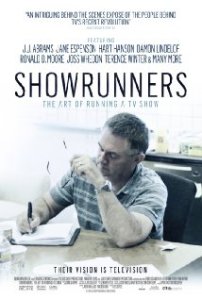 Greetings again from the darkness. It’s simultaneously “the best job and the worst job”. While not a definition of a TV Showrunner, that is certainly the best description. With the recent renaissance of TV, and the competition between networks, cable and the internet, an incredible level of creativity and freedom has produced a more cinematic effect on the small screen. Whose broad shoulders are responsible for what we watch? The Showrunners, that’s who.
Greetings again from the darkness. It’s simultaneously “the best job and the worst job”. While not a definition of a TV Showrunner, that is certainly the best description. With the recent renaissance of TV, and the competition between networks, cable and the internet, an incredible level of creativity and freedom has produced a more cinematic effect on the small screen. Whose broad shoulders are responsible for what we watch? The Showrunners, that’s who.
This is a behind-the-scenes look at the process of getting a show to air, and then struggling to keep it there … it takes an enormous amount of talent and a ton of good luck. We learn that 84% of new TV shows fail, and it’s important to note that good shows often fail – not just bad ones. Director Des Doyle presents an extremely impressive succession of interviews. These are the writers, producers and showrunners of some of TV’s most innovative shows: JJ Abrams (“Lost”), Joss Whedon (“Buffy the Vampire Slayer”), Terence Winter (“The Sopranos”, “Boardwalk Empire”), and Janet Tamaro (“Rizzoli & Ives”) just to name a few. This who’s who of showrunners generously share their insight and observations on the business that more than a few call “a grind”.
Especially interesting is the concentration on the writing process. We go inside the writer’s room and hear discussions on the importance of looking at the entire season, rather than a specific episode. We learn the importance of “quality scripts on time”, meaning the writing must be good and must come fast – episodes frequently air within a month of filming. Joss Whedon advises writers to focus on moments, not on moves. Collaboration is crucial, and while nothing beats an actor who embodies a particular role (Michael Chiklis in “The Shield”), never lose sight that writing is the heart of TV shows.
Discussion of the various outlets (networks, cable, internet) leads to an explanation of how TV writing has evolved. Some shows are now designed for the increasingly-popular “binge watching”, while network shows are still in the business of “selling ads”. Another significant shift is due to Social Media. TV is described as now being like the theatre – immediate feedback is available (Twitter, Facebook). While ratings are still important, interaction between the industry and viewing public is now standard operating procedure.
It’s not often we are allowed behind the curtain in the entertainment business, but this one should be mandatory viewing for anyone with an itch to become a TV writer. You should know the stress and insecurities that accompany the talent and ego. You should understand the time pressures and the lack of recognition that often follows even those who prove successful. You should also know that for those who have it in their blood, nothing else compares. This is truly “the art of running a TV show”.
watch the trailer:



 Posted by David Ferguson
Posted by David Ferguson